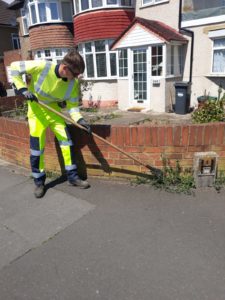Weed Control Update: Reintroduction of Glyphosate Treatment
Hounslow Highways, on behalf of the London Borough of Hounslow (the Authority), is responsible for delivering weed control services across all adopted streets where the borough acts as the Highway Authority.
Our aim is to ensure that weed control maintains an adequate level of amenity for all users of the borough’s adopted streets. This means ensuring that weeds do not impair safety, cause damage, or become a nuisance. Weed management is carried out on hard surfaces such as carriageways, footways, and footpaths, and where appropriate, in grassed areas, hedge bases, and shrub or rose beds.
Service Delivery Approach
In 2019, the use of chemical weed treatments was halted in support of the Authority’s ambition for a cleaner, greener borough that promotes biodiversity and encourages wildlife. Since then, weed removal has been carried out manually.
However, manual removal is labour-intensive and has proven less effective, particularly against persistent and deep-rooted species. Invasive weeds such as Japanese knotweed (a notifiable species under the Wildlife and Countryside Act 1981) and Mare’s Tail (also known as horsetail) present significant challenges due to their aggressive root systems. These species often require targeted herbicide treatment and, in some cases, excavation.
Why Glyphosate Is Being Reintroduced
Following extensive discussions with the Authority, it has been agreed that glyphosate-based treatments will be reintroduced for the 2025 season. This decision will be reviewed again next year.
The reintroduction is necessary due to:
- The increasing prevalence and density of weed growth
- The impact of weeds on road and footpath safety and infrastructure
- The limited effectiveness of manual removal alone
How the Programme Will Work
- Treatment Schedule: A borough-wide programme has been developed, prioritising wards based on need. You can download the weeding ward programme here Spraying Dates 2025 Map Version.
- Two Spray Cycles: Glyphosate will be applied in two treatment cycles across the borough.
- Effectiveness Monitoring: Inspections will be carried out to assess the success of the treatment.
- Manual Support: Our teams will continue to manually remove weeds from strategic routes and areas where chemical treatment is less effective.
Important Considerations
- Weather Sensitivity: Glyphosate application is weather-dependent. High temperatures can cause the spray to evaporate, while rain can wash it away, reducing its effectiveness.
- Persistent Growth: Due to several years of unchecked growth, some weeds may not be fully eradicated even with chemical treatment.
- No Weed, No Spray: Streets without visible weed growth will not be treated. If you wish to remove the weeds in your road before our teams arrive, then we will not spray where there is no weed.
- Obstructions : Spray treatment cannot be applied where weeds in channels are obstructed by parked cars.
Please click here for further guidance from the London Borough of Hounslow.
We remain committed to maintaining safe, accessible, and pleasant public spaces while balancing environmental responsibility. Thank you for your continued support and understanding.





